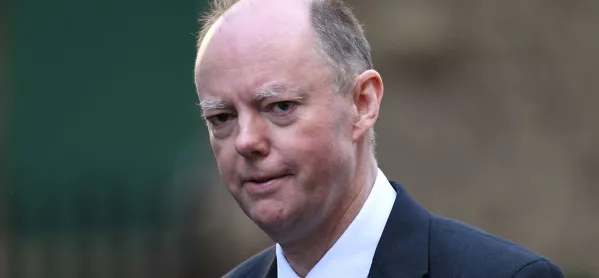- Home
- Teacher safety debate is needed, says Chris Whitty
Teacher safety debate is needed, says Chris Whitty

The government’s chief medical officer has said there needs to be a “proper debate” about teachers’ safety as schools reopen.
Professor Chris Whitty made his comment during a briefing tonight in which the prime minister, Boris Johnson, promised that schools would be “Covid-secure”.
Professor Whitty said that while reopening schools would pose a low risk to children themselves, the government would be consulting with teachers over the risks they faced.
He was speaking as new Department for Education guidance on safety in reopened schools said that most staff will not need personal protective equipment (PPE), and acknowledged that social distancing would not be maintained among the youngest pupils.
Coronavirus: Demand for rethink of ‘rushed’ school reopening plans
The plan: All primary pupils to be back in school before summer
Safety fears: School reopening plan branded ‘reckless’
Opposition: Teachers give school reopening plans a ‘resounding no’
“In a sense, there are three separate risks that people are concerned about in terms of schools,” said Professor Whitty. “One of them is risk to children, and although sadly there are a very small number of children who do get severe disease - actually, it is extremely small - the risk, the one good thing about this virus, and it really is only one good thing, is it’s very, very low in children, which is in contrast to many other infectious diseases.”
The second risk was whether “having primary schools come back” would mean “a significant upswing” in the infection rate. “The view is, if it’s done very carefully, if it’s done slowly, then it is very unlikely to do that,” he added.
Coronavirus: Safety plans for reopening schools
“The third thing is that teachers and parents are understandably concerned about individual risk, and that’s something we’re consulting on with the profession,” the chief medical officer added.
“And it is very important that we have a proper debate around that to make sure people understand that we can do many things to reduce the risk, and, as with all of society with an infectious disease, you can never reduce the risk completely to zero and that’s not a realistic aspiration, but we can reduce the risk very significantly.”
The prime minister assured a primary teacher at tonight’s briefing that the government would keep schools “Covid-secure” as she questioned him on why she could be expected to see many of her pupils but not her own family.
Taking the question from Natasha, a primary school teacher from Richmond, south-west London, Mr Johnson said that “new flexibilities” would allow people to see family members under certain conditions, and that he was going to make schools “as safe as possible”.
“Natasha, what you’re doing as a primary school teacher, thank you for that,” he said. “We will do everything we can to make sure that teachers, parents, children can have total confidence that we’re going to make those schools, your working environment, as safe as possible, and we’ll be publishing guidelines to make schools Covid-secure.”
The prime minister then called on Professor Whitty to add his comments, saying that the teacher “on the face of it has a legitimate question”.
The government’s chief scientific adviser, Sir Patrick Vallance, added that schools were a “relatively small part” of the overall spread of coronavirus, and that the government had not recommended that primary schools return now because “there’s got to be a bit more time to see that there’s room to be able to do that in terms of the changes”.
“As the prime minister has laid out, that will be done in a very staged way, so it’s not all primaries coming back, it’s some classes, it’s reduced class sizes - that allows that to be monitored so the effect can be seen. So it’s not as simple as to say everything comes back now - it needs to be done carefully, step by step,” Sir Patrick said.
Register with Tes and you can read two free articles every month plus you'll have access to our range of award-winning newsletters.
Keep reading with our special offer!
You’ve reached your limit of free articles this month.
- Unlimited access to all Tes magazine content
- Save your favourite articles and gift them to your colleagues
- Exclusive subscriber-only stories
- Over 200,000 archived articles
- Unlimited access to all Tes magazine content
- Save your favourite articles and gift them to your colleagues
- Exclusive subscriber-only stories
- Over 200,000 archived articles



